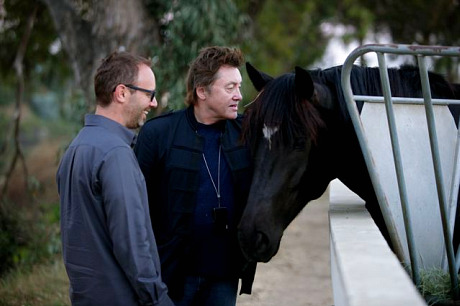
Will Rogers State Park corral — Saturday, 7.24, 8:15 pm.


Will Rogers State Park corral — Saturday, 7.24, 8:10 pm.

Saturday, 7.24, 8:55 pm




Inception nudged ahead of Salt yesterday, but just barely. The bottom line is that Inception has caught on big-time and Salt is being sampled. Reactions to the latter?
Last night I took an instant dislike to Sur, a white-walled, Moroccan-appearing restaurant in West Hollywood that a lady friend (an ex-literary agent, now producing a feature) talked me and a couple of friends into patronizing. It’s nicely lit with candles and decorated with large flower urns and has a kind of casbah-in-Tangiers vibe, but it’s essentially an environment for vaguely shallow, easily-impressed, Maxim-magazine-reading, out-on-the-town tools who don’t know any better.
Listen to the music that kicks in when you visit the website…good God! I was particularly offended by the peon T-shirts that the male waiters wore (i.e., the name “Sur” spelled out in sparkly gold letters) and the hot-casino-hooker dresses that the waitresses are obliged to don.
I was particularly revolted by the synthetic disco music that they began playing around 10:30…party hour! We asked one of the waiters if they could please not play this music. He said “of course” and then went away and the music continued. We asked him again and he said “yes, surely” and went away and the music continued. Okay, that’s it, I told myself. I’m going to get these guys.
So did a Steve Buscemi and left no tip. I’ve generously tipped waiters and waitresses all over the world, but last night I had to draw a line. Something in me revolted. I will not tip any waiter or waitress wearing garish Tijuana-level clothing that I wouldn’t wear with a gun to my head, and I will deprive any waiter or waitress working in a restaurant that plays disco music of any and all gratuities. If they choose to work at a Vegas-styled place like this, it’s their problem. If they can’t figure out there are people like me whose stomaches fill up with acid when subjected to disco music, that’s their misfortune. Actions have consequences.
The food, drink and service were totally fine. That wasn’t the issue. Subject me to an Uday Hussein-type environment and someone, trust me, is going to pay.
I too now have a copy of Terrence Malick‘s The Tree of Life script, and will consider sharing it with specially trusted correspondents. It’s dated 6.25.07, and runs 126 pages. I love how someone — Malick? — has hand-written various words on each and every page, words that weren’t printed clearly enough and/or required clarification, whatever.

“Eternity — that realm of pure and endless light. How shall we represent it? A single image might serve better than several combined. The whole creation is in the figure of a tree. The smallest leaf communicates with the lowest root, all parts feeding on the same sap, breathing in the same air and sunlight, drawing the same life up from the darkness of the early below.”
Empire‘s Genevieve Harrison has broken the embargo on The Expendables (Lionsgate, 8.13) with a fairly tough pan. “More The Wild Geese than The Wild Bunch, The Expendables is not a wasted opportunity, but is one not fully exploited,” she writes. “Even action fans raised on Commando and Cobra might wish for something better.
“Clive James once described Arnold Schwarzenegger as looking like ‘a condom filled with walnuts’ — now it’s the other way round. Perhaps that’s why director-writer-star Sylvester Stallone (64) has recruited young upstarts like Jason Statham (38) and Jet Li (47) to accompany fellow fossils-with-muscles Dolph Lundgren (52), Bruce Willis (55), Mickey Rourke (57) and Arnie (63) to take down the bad guys (and possibly the insurance premiums).
“If only Sly had spent less time on the phone to his mates, and more on the script.
“Instead it seems that, having assembled his dream cast — and thrown in wrestler ‘Stone Cold’ Steve Austin and Ultimate Fighting Champion Randy Couture for the ‘kids’ — Stallone clearly felt that such fuddy-duddy film staples as story, characterisation and dialogue that makes sense were, well, expendable.
“Sure, there’s some direct-to-video-level plotting and an attempt at creating motivation for Stallone and his fellow cigar-chompers to care — in a nutshell, ‘The general’s daughter is a hottie’ — but that’s really as far as it goes.
“As the film lurches from scene to scene, one becomes increasingly convinced that not only is everyone making it up as they go along (director Stallone shares a screenwriting credit, so it’s entirely plausible), but that Sly could only convince his cast to jump on board if he agreed to very specific, and often very strange, demands: ‘I want a scene where I kick Jet Li’s ass.’ ‘I want to blow up a dock from the open-air gun turret of a giant seaplane.’ ‘I want to meet Charisma Carpenter, can you fix us up?’ (And apparently, in the case of the much-ballyhooed on-screen team-up between Stallone, Schwarzenegger and Willis, ‘I want a scene with all the verbal and visual fireworks of a Planet Hollywood annual general meeting circa 1993.’)
“That said, The Expendables does what it says on the tin: it delivers a super-size portion of bone-cracking, bullet-spraying, muscle-flexing, head-exploding action, thankfully with the kind of tongue-in-cheek ironic distance which was fatally absent from Stallone’s last directorial outing, the ill-advised, ill-fated Rambo. Although the set-pieces are hardly on a par with the man-fires-tank-falling-out-of-plane antics of the all-new A-Team, the fight scenes prove that the almost-all-old ‘E’-Team can still cut it when push comes literally to shove.
“If nothing else, it gives the audience a chance to answer the perennial question, who would win a no-holds-barred fight between Dolph Lundgren and Jet Li?”
The Second Recession is looming and threatening to spread across everyone and everything. One million home-owners are expected to lose their homes this year. Fed chairman Ben Bernanke has just said that the country faces “unusually uncertain prospects.” Does this suggest that Company Men (Weinstein, 10.122) will strike a kind of communal chord when it opens three months hence, or will the opposite effect happen?
In a 1.23.10 Sundance review, I wrote that this drama of layoffs and despondency affecting three Boston-area white-collar guys (Ben Affleck, Tommy Lee Jones, Chris Cooper) “plays like an intelligent funeral in a nicely furnished minimum-security prison.”
John Wells‘ drama “is an honest and competently assembled attempt to capture the Great Recession lamentations of the moment, but the story just kind of plods along. It feels lifeless and confined — stuck with itself with no escape plan. It’s kind of proud, in fact, of being a story about well-dressed prisoners and their wives and children. Each dawn I die.
“Wells was obviously convinced that just telling these three stories in a plain, no-frills, reality-reflecting way would suffice. Over and over Company Men says that losing one’s job can be devastating on several levels, that unemployment requires lifestyle cutbacks, that older men need sometimes need the jolt of an affair to feel alive, that job-seekers frequently fall into denial and despair, and that this country’s inability to compete in the honest making of things amounts to a huge spiritual deficit.
“Yeah — agreed, agreed. But I kind of knew or suspected all of this. And yet the movie confines itself in an upper middle-class ghetto that feels — I’m going to steal a line from Camille Paglia — so lacking in ‘the lurid pagan truth about life.'”
“There’s no madness, no sexual intrigue to speak of, no wily characters, no humor, no violence, no fist fights, and no Sopranos-style aplomb in portraying the grim or ironic undercurrent of things among suburbanites with power and money, etc.
“Company Men is obviously occupying a portion of the same turf as Up In The Air minus the Clooney-and-Farmiga charm, the emotional resonance, the air miles, the sharp dialogue and the smartly angled characters.
“Kevin Costner has a smallish role in Company Men as the house-renovating brother of Affleck’s wife, played by Rosemary DeWitt. He doesn’t have very many lines, but I wish the story had been mostly about him because he’s easily the most appealing personality on the boat. The second most engaging performance is given by Craig T. Nelson as the blunt-spoken CEO of the company whose cost-trimming decisions cause all the grief.
“I’m genuinely sorry to have said most of this. A team of smart, sophisticated and well-intentioned people made Company Men, but it’s an absolute stiff in terms of real-world theatrical potential. I could see watching Company Men on HBO on a Sunday evening and going ‘yeah, not half bad,’ but I wouldn’t dream of recommending it as a movie to go out and pay $12 bucks to see plus parking and popcorn.”
Yesterday morning I met with the famous LexG at Mel’s Drive-In, and he gave me an idea for a riff — established actors afflicted every so often with bad movie streaks. They’ll step into a pile of dogshit and won’t be able to get the smell off their shoes for three, four or five years (or longer), and a can’t-win thing settles in. Before they know it they’re stuck in in the mud, mediocre film to mediocre film, no end in sight.
And then, if they’re lucky…deliverance. A good part in a good film comes along, and their karma changes. Maybe not from black to white, but things will begin to look up.
Movie stars are not immune. Clint Eastwood had a bad run from ’86 to ’90 — Heartbreak Ridge, The Dead Pool, Pink Cadillac, The Rookie, White Hunter Black Heart. It almost seemed as if Clint was starting to be a little bit over. And then he made Unforgiven and everything turned around.
How many bad streaks has Bruce Willis gone through? Three, four? He couldn’t catch a solid part in a truly exceptional film for six years after his break-out role in Die Hard (’88). I realize that Look Who’s Talking I & II, In Country, Die Hard 2, The Bonfire of the Vanities, Mortal Thoughts, Hudson Hawk, Billy Bathgate, The Last Boy Scout and Striking Distance weren’t 100% wretched, but the air was definitely hissing out of the balloon. Willis saved himself, of course, with his Butch role in Pulp Fiction. At least two more hard-luck streaks followed that I don’t have the energy or time to cover.
You know who’s never suffered from a bad run? Tom Cruise. He’s made an off film now and then but never in streaks or groups. He’s always rebounded after a setback.
If bad streaks go on for too long the actor/actress in question starts to be thought of as cursed. Poor Dennis Quaid went through a 15 year bad streak (’84 to ’99) that was punctuated only by strong character turns in Wyatt Earp and Postcards From The Edge. He finally broke the streak, in my view, with his performance as Jack Rooney in Any Given Sunday followed by a respectable turn as a crooked attorney in Traffic.
With the exception of her break-out role in Almost Famous, it could be argued that Kate Hudson‘s entire career has, in a manner of speaking, been a bad streak. She’s been in many profitable films or hits even, but almost everything she’s made since Almost Famous has been shit. (The arguable exception is The Killer Inside Me.)
A bad-luck streak is the worst thing that can happen to anyone. It’s like God has decided to mess with you for a while — a month, a year. Just for the pleasure of it. There’s a line in Glengarry Glen Ross in which Shelley Levine says, “I pray in your life you will never find it runs in streaks…streaks!”
Tony Gilroy has a line in Michael Clayton about how some guys go through life wondering why shit keeps raining down on them, the implication being that it’s mostly their fault. (Which it usually is.) But sometimes life will just decide to fuck you. You don’t know how it’s happened exactly or what you’ve done to deserve it, but it won’t stop, and after a while you start to bend over like an old tree that’s been hit with hurricane winds for several days straight.
Salon‘s Matt Zoller Seitz has asked an array of film writers and filmmakers to share their greatest (most vivid, transporting, surprising, impassioned, absurd) moviegoing memories. Or, as the subhead puts it, “the sights, sounds and feelings that have stayed long after the lights came up.”
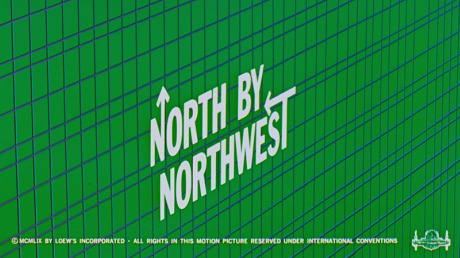
I’m one of about 14 or 15 contributors. (My story is about a calamitous Manhattan screening of North by Nothwest that happened about…good God, 30 years ago.) The articles are short, nicely edited, illustrated. It seems extra cool that under each movie title the where and when (i.e., which theatre and in what town/city the special experience happened in, and the year) are provided.
Here’s mine:
“In 1980 or ’81 I attended a weekend showing of Alfred Hitchcock‘s 1959 thriller North by Northwest at the Regency, an Upper West Side rep house owned by Dan Talbot. It was a late-afternoon screening, which to me indicated that a fair number of hard-core Hitchcockians were in attendance.
“Sometime around the end of the 20th Century Limited train scenes and the crop-duster sequence, the projectionist skipped a reel. Thirteen or 14 minutes’ worth bypassed!
“Silence, at first. And then whistles, claps, hoots, ‘Yo!’
“The dumb-shit projectionist (whom I instantly envisioned as being a cousin of Pete, the Akim Tamiroff-resembling Greek diner owner played by John Belushi in an old SNL skit) wasn’t responding.
“All at once three or four of us got up and walked into the lobby and bounded up the stairs to the projection booth. Knock-knock, bang-bang…hey, man! Which the projectionist completely ignored. He was scared, we later realized, and had called the manager. But our blood was up. Skipping an entire reel of North by Northwest was an outrage…hey! Bang-bang, boom-boom, ‘Canary bird, will ya get outta the bathroom?’
“Finally the manager responded, but like a riot policeman. He ran up to the projection booth door and turned toward us, panicked expression, back proverbially arched. ‘Get back! Get back!’ His eyes and tone of voice were exactly like those of Marcel Bozzuffi, the French assassin in The French Connection who tried to shoot Gene Hackman and was later cornered on a moving subway train by MTA cops.
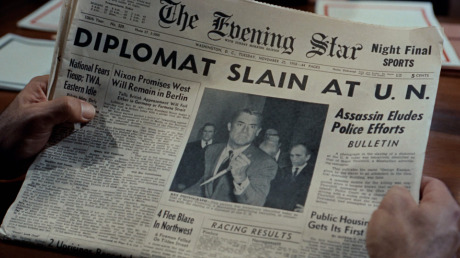
“Why did the Regency projectionist (aka ‘Pete’) and the manager go into Defcon 1 mode? Why didn’t they simply smile and raise their hands and say, ‘Okay, we get it, guys…we made a mistake…we’ll fix it right away’? That would have shut us up immediately. Instead were treated as raucous invaders rather than justifiably motivated film buffs, and so we the people got angrier than we should have.
“There’s a lesson in civic relations here, but particularly one for theater owners. That lesson is ‘film buffs are always right.’ If they say the sound is muffled or weak, it probably is. Don’t debate it — fix it!
“The next day I got a call from someone in Talbot’s office. I was the bad guy, in their view. I had caused the problem.
“Well…but of course!”
Here’s another good one, about a 1996 viewing of Striptease at a Mahattan Cineplex Odeon, written by Daniel McKleinfeld:
“The most memorable movie-theater moments usually happen during bad movies, not good ones. There’s something about watching a truly wretched flick that bonds the audience together like a platoon slogging through an infested jungle. Back in the ’90s, the best place to do such slogging was the Cineplex Odeon, the last second-run house in NYC, where movies got one last chance to hobble across the stage before collapsing into the video racks. And it was there that I had the most powerful moment of personal validation ever to take place in a movie theater.
“Tickets to the Cineplex Odeon were $2, a price that encouraged teens on cheap dates, and marginally employed artists. So competition was fierce to be the most entertaining thing in the room, not excluding that thing on-screen. But for a while, the Demi Moore vehicle Striptease had us all struck dumb — the crazy shifts in tone, the tacky costumes, Ving Rhames’ Samuel-Jackson-on-codeine act — there was just nothing to say.
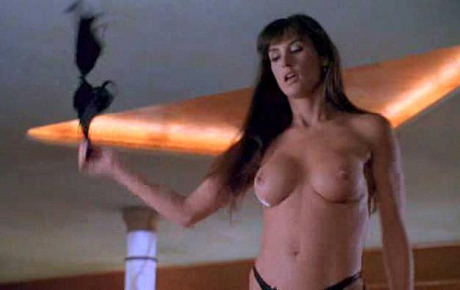
“But then, about a third of the way through, the movie steps out of the strip club. We have a long scene laying out the details of our heroine’s custody battle. Moore, refusing to let a little girl see her mom crumble, sends her daughter to play on the beach. The camera pushes slooooowly toward Moore’s radiant face, a single tear welling up in her eye. We cut to the little girl, gaily skipping across the beach as the sun sets. We push in toward Moore’s welling tear ducts. Closer…closer…the tear begins to fall.
“And I yell: ‘MORE STRIPPING!’
“At that very instant, smash-cut to rhinestone-covered ta-tas, flouncing across the stage at the Eager Beaver.
“I at once respond: ‘THANK YOU!’ And the crowd goes wild.
“I may never be that cool again.”
A friend has read an early draft of Terrence Malick‘s Tree of Life script “and here’s what I can tell you, other than that it’s wonderful,” he writes. “Of course, there is a very good chance that the finished film will look nothing like this, given Malick’s track record. But it really does appear to have borrowed not just a page, but several whole chapters from 2001: A Space Odyssey‘s book.
“The bulk of the script takes place in the 50s, as has been reported. The protagonist is Jack, the oldest of three brothers in a Texas family with more than a passing resemblance to the Malick family itself, as he learns about the ways of the world. The film starts off with the death of one of the brothers, the family in despair, then settles on the grown Jack (Sean Penn), depressed, in the modern world.
“Then, it basically goes somewhat Koyaanisqatsi on us, showing the despair of our world, of urbanity, etc. The idea being that Jack’s despair is mirrored all around him, in man’s alienation from the infinite. Or as the script puts if, ‘The supreme misery…to find oneself abandoned to the busy dance of things which pass away.’
“All that, however, is basically prologue. As Jack searches for some kind of reconnection to the world, the film flashes back to the beginning of time. We see the creation of galaxies: ‘The growth of the cosmos, the great epic of evolution, from the Big Bang through the long ages of geological time, down to the present day,” it reads. The language here is absolutely beautiful — half philosophy, half science, all poetry — and we’ll see how it works in the film, how much of it actually winds up in there, how much time it takes.
“But the dinosaurs are a very small part of it in the script, like half a page. We see them appear, then we see them wiped out, then we see the mammals begin to emerge.
“And then, we see Jack’s childhood, his first discovery of the world, his connection to his parents, the arrival of his brothers, and their coming of age. The stuff with the family is wonderful, but it’s not very plot driven, small little moments built on small little moments. The kind of thing only Malick can pull off. This is the bulk of the script itself, 100 pages or so out of 126.
“The third part of the film flashes forward, and we see the death of the universe. This is again in the mode of those early scenes that showed us the creation of the galaxy and of human life. We see the Earth grow hotter and then die, basically. We see the galaxy die, but then we see new ones come about, and we see the visual manifestation of the Multiverse theory.
“Again, so much of this is conveyed through such powerful language that it’s hard not to come away from the script powerfully moved. The idea is not that the worries and cares of humans are smaller than a tiny speck of sand, but that we’re part of some vast process, that ‘the same power which burns in the stars and nebulae burns equally in us.”
“To what extent it will be realized on screen, and how much time it will probably take, remains to be seen.”
96% of Kirk Douglas‘s activities in Paths of Glory involve standing around and talking. Every now and then he strolls or sits or walks up stairs, but mostly he stands and talks. Strategy, protocol, orders, arguments for the accused. He spends 4% of the film leading the charge against the German “Ant Hill”and getting dirt and dust on his face. I nonetheless accept Criterion’s decision to exploit this 4% to sell their upcoming DVD/Bluray of Stanley Kubrick‘s 1957 film.
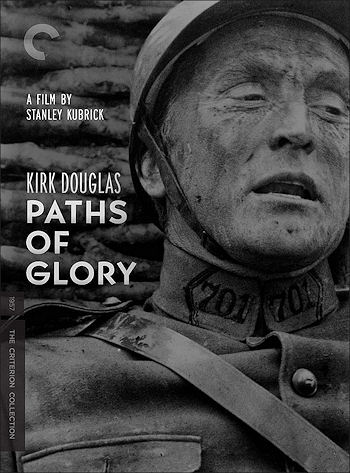
“I apologize for not being entirely honest with you. I apologize for not revealing my true feelings. I apologize, sir, for not telling you sooner that you’re a degenerate, sadistic old man. And you can go to hell before I apologize to you now or ever again!”
Videogum‘s Gabe is my kinda guy. A serious Comic-Con hater who knows how to explain why any reasonable person might feel the same way. Here‘s half of his 7.22 posting called “Comic-Con is Humanly Impossible.”
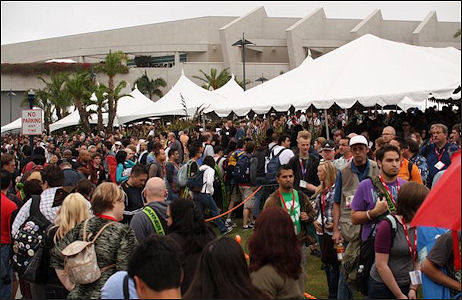
“It’s difficult to fully capture the scale of this shit show. And I don’t mean to be a wet blanket, or to harp on a broken record about a dead horse, but Comic-Con is a shit show.
“We showed up this morning at what we considered to be a perfectly reasonable time, and it turned out that it was not reasonable at all. A reasonable time to wait in line for six hours to watch ten minutes of a movie that is going to come out in eight months is 6 am. You can see Harry Knowles wheel himself into Hall H against the backdrop of the rising sun. Of course, Knowles has the last laugh, because he was sitting front and center for the preview of Megamind. He probably no longer even sees this Matrix: just a bright string of green numbers: ‘There is no line.’
“There is no wifi service at Comic-Con, and very spotty cell phone service. Bear in mind for whom this conference is intended. In 2010, having no wifi and spotty cell phone service already seems like the plot to Before Night Falls, but at a convention for nerds and blogs?
“The truth is that you are an adult, and you would love to see sneak previews of things if it didn’t require stretching the limits of human patience and discomfort. But an hour later the man will come out and reveal to you, which in your heart you knew all along, that not a single person left the hall after the Megamind panel, and they are all staying for the Tron panel, and so now the line you are in is officially the line for the Salt panel, which begins in another two hours. At which point you realize that there are three more days of this shit.
“What I’m trying to get at is that it seems fully possible for one to spend one’s life in an infinite Comic-Con line with no determinable outcome. You will be like Seido in Inception, getting noodles in your old-man beard, wondering whether shooting yourself in the head would fix anything.
“What [Comic-Con] is about is shoving endless promotional materials for uninspired and/or unnecessary nonsense into increasingly large branded gift bags. If you would like to know how it feels to be at Comic-Con it feels like you are a door, and people won’t stop shoving fliers under you. A door saddled with oversized garbage bags.”
This kind of thing plus numerous ventings of hostility toward celebrity paparazzi makes Sean Penn a better-than-okay guy in my book.